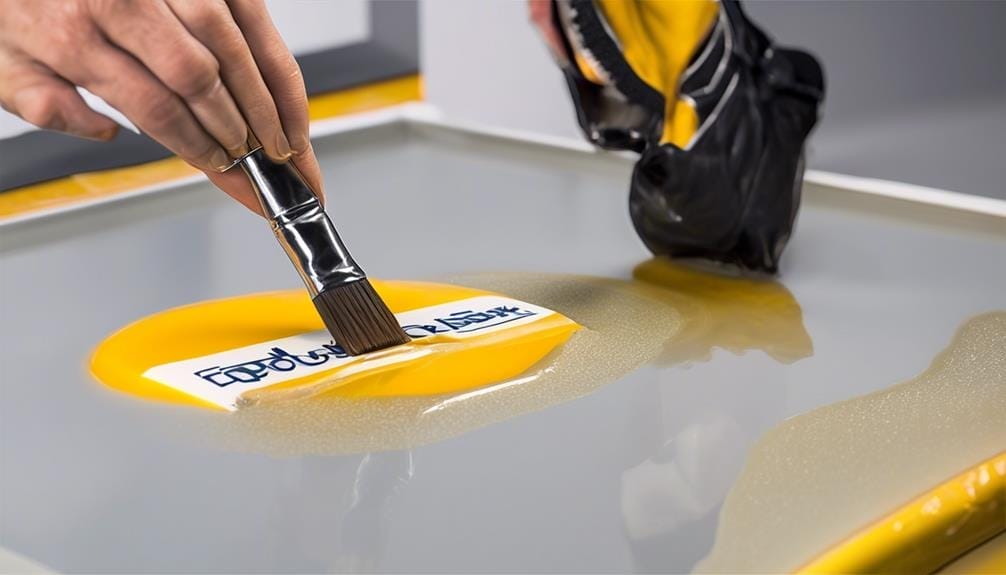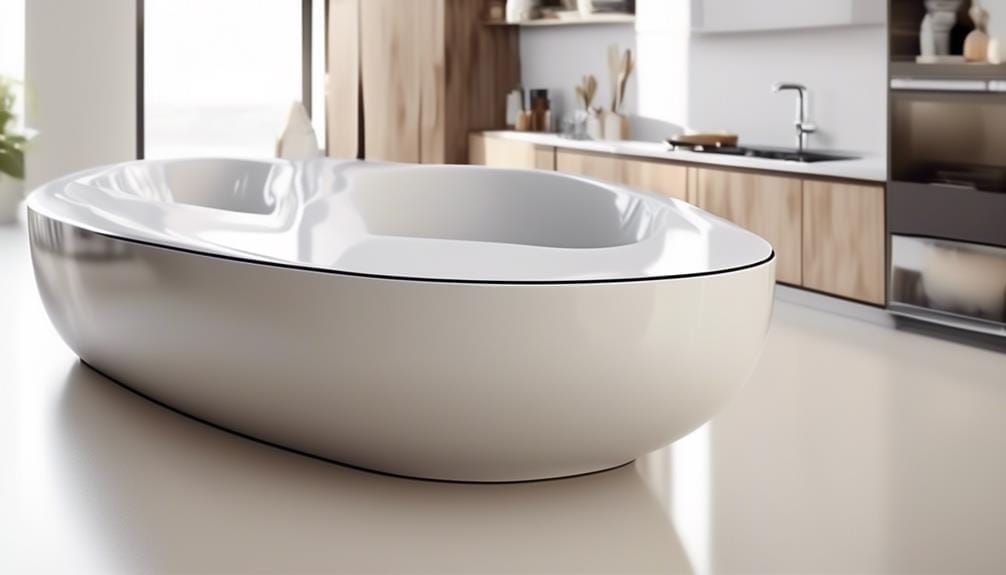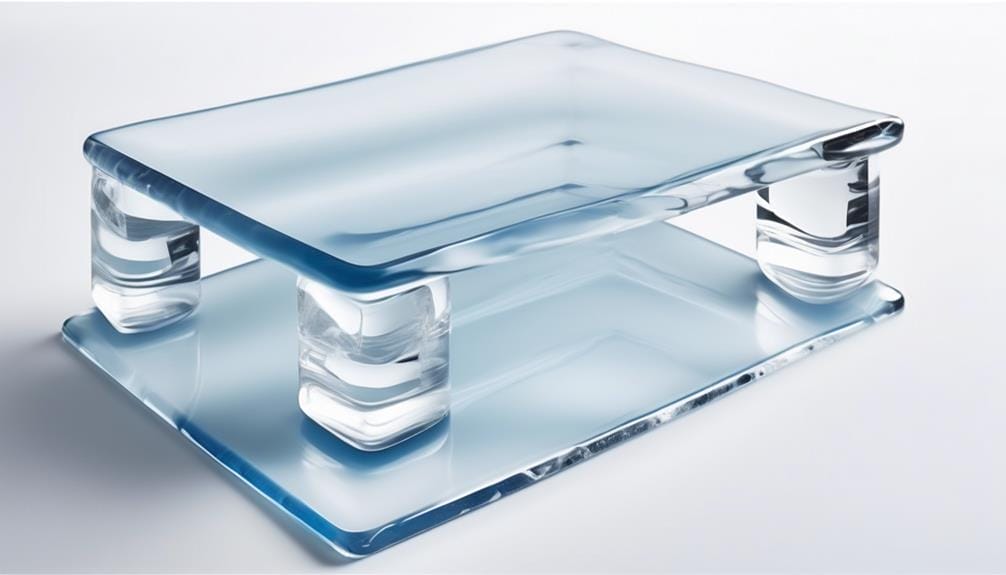Like two sides of the same coin, epoxy resin and polyurethane stand as formidable contenders in the realm of materials. One is as hard as nails, quickly curing to provide an impenetrable barrier against chemicals and wear. The other, flexible and resilient, can withstand extreme temperatures and endure the harshest conditions.
But which one should you choose? In this discussion, we will explore the unique properties and advantages of epoxy resin and polyurethane, shedding light on their differences and helping you make an informed decision.
So, let's dive into the world of these versatile materials and uncover the secrets they hold.
Key Takeaways
- Epoxy resin offers excellent chemical resistance, durability, and strength, making it suitable for structural adhesives, insulators, powder coatings, and corrosion prevention applications.
- Polyurethane provides superior flexibility, elasticity, and resistance to abrasion, making it widely used in medical equipment, flooring, electrical industries, marine applications, and packaging foam.
- Epoxy resin has quick curing and strong stability, while polyurethane has varying viscosity and curing time options.
- Epoxy resin requires proper surface preparation for adhesion and has a longer curing time compared to polyurethane.
Understanding Epoxy Resin
Understanding epoxy resin is crucial in order to fully comprehend its potential applications and benefits. Epoxy resin is a versatile plastic polymer that's primarily used for coatings, fillers, and adhesives. It cures quickly, forming a hard plastic with exceptional strength, stability, and chemical resistance. This makes it suitable for a wide range of applications, including structural and engineering adhesives, corrosion prevention, and waterproof coatings.
Epoxy resin is particularly well-suited for use with appliances and various metals due to its ability to provide excellent chemical resistance, durability, and strength. Additionally, it's commonly utilized in high traffic areas and in environments exposed to heavy machinery and equipment.
In terms of cost-effectiveness, epoxy resin generally proves to be more economical than polyurethane. However, it may require occasional touch-ups and repairs, as well as more frequent cleaning to maintain its appearance.
Exploring Polyurethane Properties
Polyurethane, a versatile material developed as an alternative to rubber during World War II, possesses a wide range of properties that make it suitable for use in various industries.
- Polyurethane is used in solid parts, coatings, paints, adhesives, and foams, finding applications in medical equipment, flooring, electrical industries, marine applications, and packaging foam for delicate items.
- It's produced by combining diisocyanates with polyols, offering comfort, wear resistance, insulation, strength, and protection.
- Polyurethane provides superior flexibility, elasticity, resistance to abrasion, extreme temperatures, chemicals, and solvents, making it a reliable choice for diverse applications.
- Specific uses of polyurethane include binding wood panels for furniture, insulation in refrigerators, and as an efficient energy-saving material in refrigeration.
These properties make polyurethane a highly sought-after material in various industries. Its versatility and wide range of applications have contributed to its popularity and widespread use.
Whether it's for providing comfort, strength, insulation, or protection, polyurethane delivers exceptional performance. Its ability to withstand harsh environments, resist chemicals, and maintain flexibility makes it an ideal choice for many applications. The seamless and smooth finish it offers adds to its appeal.
As technology continues to advance, polyurethane is likely to find even more applications and further solidify its position as a key material in various industries.
Differences in Application

When comparing epoxy resin and polyurethane, one notable difference lies in their applications. Epoxy resins require proper surface preparation for adhesion, ensuring that the substrate is clean and free from contaminants. On the other hand, polyurethane can be applied to a wider range of substrates without the need for extensive surface preparation. This makes polyurethane a more versatile option for various projects.
Another difference is the curing time. Epoxy resins have a longer curing time compared to polyurethane. This characteristic makes epoxy resin suitable for high traffic areas where durability and resistance to wear and tear are crucial. Polyurethane, on the other hand, cures relatively faster and is more forgiving in terms of application errors. This makes it easier to work with and allows for quicker project completion.
In terms of cost-effectiveness, epoxy resin generally comes out on top. It's a more affordable option compared to polyurethane. However, it may require more frequent touch-ups and cleaning to maintain its appearance over time. Polyurethane, with its greater flexibility and elasticity, offers a wider range of applications and is better suited for environments that require resistance to abrasion, chemicals, and extreme temperatures.
Strengths of Epoxy Resin
Epoxy resin exhibits a range of strengths that make it a reliable choice for various applications. Its unique properties contribute to its popularity in different industries. Here are some of the strengths of epoxy resin:
- Excellent Chemical Resistance: Epoxy resin provides exceptional resistance to harsh chemicals and acids. This quality makes it suitable for areas that are exposed to corrosive substances, such as laboratories and industrial facilities.
- High Durability and Strength: With its high durability and strength, epoxy resin is an ideal material for heavy-duty applications. It can withstand heavy machinery, equipment, and high-traffic areas, ensuring long-lasting performance.
- Impact and Traffic Resistance: Epoxy resin is known for its ability to withstand heavy traffic and impact. This makes it a reliable choice for industrial and commercial flooring, where durability and resistance to wear and tear are essential.
- UV Resistance: Unlike some materials that degrade when exposed to UV rays, epoxy resin is resistant to UV degradation. This quality makes it suitable for outdoor applications, where it can maintain its performance and appearance for extended periods.
Advantages of Polyurethane

One of the key advantages of using polyurethane is its superior flexibility and elasticity compared to epoxy resin. Polyurethane has the ability to stretch and bend without breaking or cracking, making it an excellent choice for applications that require a high degree of flexibility. This property allows polyurethane to withstand movements and vibrations without compromising its structural integrity. In contrast, epoxy resin is more rigid and brittle, making it less suitable for flexible applications.
Another advantage of polyurethane is its excellent resistance to abrasion. Its durable nature makes it ideal for high-traffic areas where surfaces are subjected to constant wear and tear. Polyurethane can withstand heavy foot traffic, machinery, and other sources of abrasion without deteriorating or losing its protective properties. Epoxy resin, on the other hand, may wear down over time and require frequent maintenance or replacement.
Polyurethane also offers good resistance to chemicals and solvents, enhancing its durability. It can withstand exposure to a wide range of chemicals without undergoing significant degradation. This makes polyurethane suitable for environments where exposure to harsh chemicals is common. Epoxy resin may be more susceptible to chemical damage and may require additional protective coatings for increased resistance.
Furthermore, polyurethane can withstand extreme temperatures, making it ideal for diverse environmental conditions. It remains stable and maintains its properties even in hot or cold environments. This attribute makes polyurethane suitable for a wide range of applications, including outdoor structures and equipment. Epoxy resin may become brittle or lose its structural integrity under extreme temperature conditions.
Lastly, polyurethane provides a seamless and smooth finish, adding aesthetic appeal to surfaces. It can be applied evenly and smoothly, resulting in a visually pleasing appearance. Epoxy resin may require additional steps or techniques to achieve a seamless finish.
Choosing the Right Material
When choosing between epoxy resin and polyurethane, it's important to consider the material properties comparison and the specific requirements of your application.
Epoxy resin offers excellent chemical resistance, durability, and strength, making it suitable for high-traffic areas and heavy impacts.
On the other hand, polyurethane provides superior flexibility, elasticity, and resistance to abrasion, making it ideal for areas with extreme temperatures and high moisture levels.
Assessing factors such as heat tolerance, scratch resistance, bacterial growth prevention, and long-term maintenance costs will help you make an informed decision on the right material for your needs.
Material Properties Comparison
Comparing the material properties is crucial when selecting the right material for your specific application. Here is a comparison of the material properties of epoxy resin and polyurethane:
- Epoxy resin offers excellent chemical resistance, high durability, strength, and resistance to UV degradation. It's commonly used in structural adhesives, insulators, powder coatings, and corrosion prevention applications across various metals.
- Polyurethane, on the other hand, provides superior flexibility, elasticity, resistance to abrasion, extreme temperatures, and chemicals. It's widely used in medical equipment, flooring, electrical industries, marine applications, and packaging foam.
- Polyurethane is produced by combining diisocyanates with polyols, while epoxy resin offers varying viscosity and curing time options for different applications.
- Epoxy resin provides quick curing, strong stability, and chemical resistance, making it suitable for protective coatings, adhesives, and repairs.
Considering these material properties will help you make an informed decision between epoxy resin and polyurethane for your specific application.
Considerations for Application
To choose the right material for your specific application, it's important to consider several factors, including the intended use and the unique properties of epoxy resin and polyurethane.
Epoxy resin is well-suited for structural and engineering adhesives, circuit creation and protection in electronics, as well as waterproof and rust-proof coatings.
On the other hand, polyurethane finds common use in medical equipment, flooring installation, electrical insulation, and marine applications.
When making a decision between the two, it's crucial to take into account the surface preparation required. Epoxy resin demands proper preparation for adhesion and has a longer curing time compared to the more forgiving polyurethane.
Additionally, epoxy provides superior chemical resistance, durability, and strength, making it suitable for areas exposed to heavy machinery and equipment, while polyurethane performs well in high-moisture environments and areas with thermal shock and extreme temperatures.
Epoxy Resin Vs. Polyurethane: Performance Comparison

When comparing the performance of epoxy resin and polyurethane, two key points to consider are durability and application differences.
Epoxy resin offers excellent chemical resistance, high durability, strength, and resistance to UV degradation, making it suitable for high traffic areas.
On the other hand, polyurethane provides superior flexibility, elasticity, resistance to abrasion, extreme temperatures, and chemicals, allowing for a seamless and smooth finish.
Understanding these performance aspects can help you make an informed decision when choosing between epoxy resin and polyurethane for your specific application.
Durability Comparison
The durability of epoxy resin and polyurethane can be assessed through a performance comparison. When comparing the durability of these two materials, several factors should be taken into consideration:
- Chemical Resistance: Epoxy resin exhibits superior resistance to chemicals, making it ideal for environments with corrosive substances. Polyurethane, while also resistant, may not withstand certain harsh chemicals.
- Impact Resistance: Epoxy resin is known for its high impact resistance, making it suitable for areas prone to heavy foot traffic or impact. Polyurethane, on the other hand, may be more susceptible to damage from impacts.
- UV Stability: Epoxy resin has low resistance to UV radiation, which may cause it to yellow or become brittle over time. Polyurethane, however, offers better UV stability and can maintain its appearance and performance in outdoor applications.
- Moisture Resistance: Both epoxy resin and polyurethane are generally moisture-resistant, but epoxy resin has better moisture barrier properties, making it more suitable for applications that require superior protection against moisture.
Application Differences
Epoxy resin and polyurethane exhibit distinct differences in their application methods and performance characteristics. When it comes to application, epoxy resin requires proper surface preparation to ensure adhesion. It is commonly used in high traffic areas due to its excellent chemical resistance and durability. On the other hand, polyurethane can be applied to a wider range of substrates and is more forgiving in terms of application errors.
To help you visualize these differences, here is a comparison table:
| Aspect | Epoxy Resin | Polyurethane |
|---|---|---|
| Surface Preparation | Strict | More flexible |
| Chemical Resistance | Excellent | Superior |
| Durability | High | Flexible |
| UV Resistance | Resistant | Not as strong |
| Maintenance | More frequent | Less frequent |
| Lifespan | Around 5 years | Approximately 10 years |
| Cost | Lower initial cost | Higher initial cost |
| Resistance to Corrosion | Limited | Unrivaled |
This table provides a clear overview of the application differences between epoxy resin and polyurethane. Consider these factors when deciding which material is best suited for your specific project.
Conclusion: Making an Informed Decision
To make an informed decision between epoxy resin and polyurethane, it's crucial to consider the specific application and evaluate the properties and characteristics of each material in relation to its intended use. Here are some key factors to consider:
- Consider the specific application: Evaluate the properties and characteristics of each material in relation to the intended use to make an informed decision.
- Assess longevity and maintenance: Compare the lifespan, maintenance requirements, and associated costs to determine the most suitable option for your project.
- Examine environmental factors: Consider the impact of heat, cold, and chemical exposure on the materials to ensure they'll perform optimally in their intended environment.
- Cost-benefit analysis: Weigh the initial cost, long-term maintenance, and replacement expenses to make an economically sound decision.
Frequently Asked Questions
Is Polyurethane Stronger Than Epoxy Resin?
Polyurethane is generally stronger than epoxy resin in terms of durability. It offers superior flexibility and elasticity, making it a suitable choice for areas with heavy traffic or where long-lasting strength is required.
What Is Better Epoxy or Polyurethane for Countertops?
For countertops, both epoxy resin and polyurethane have their pros and cons. When comparing durability and maintenance, consider factors like chemical resistance, flexibility, and surface preparation requirements.
What Is the Major Disadvantages of Epoxy Resin?
The major disadvantages of epoxy resin include its susceptibility to yellowing and degradation from sunlight, higher risk of cracking and chipping, longer curing time, need for frequent reapplication, and limited resistance to organic acids. Consider exploring alternative options like polyurethane.
What Is Better Than Epoxy Resin?
Polyurethane is a better alternative to epoxy resin. It is not toxic, making it safe for various applications. Additionally, it offers superior scratch resistance and can withstand impacts better.
Conclusion
In the battle between epoxy resin and polyurethane, both materials have proven their worth in various industries.
Epoxy resin stands strong with its quick curing time, hard finish, and chemical-resistant properties, making it a reliable choice for protective coatings and repairs.
On the other hand, polyurethane offers flexibility, abrasion resistance, and extreme temperature resistance, making it a versatile option for flooring, insulation, and medical equipment.
Ultimately, the decision boils down to the specific requirements of the application, ensuring the best material is chosen for optimal performance and durability.





